Featured Courses
Measles: Overcoming Vaccine Hesitancy (20% off)
Florida: Specialized Alzheimer's Adult Day Care, Level One
Florida: Specialized Alzheimer’s Adult Daycare, Level Two
About Cultural Competency in Oregon
About Cultural Competency in Nevada, 4 units
About Health Equity in Washington State
California: Implicit Bias for Healthcare Providers
Kentucky: Implicit (Unconscious) Bias
Balance, Postural Control, and Falls in Older Adults (50% off)
US flu activity takes big jump as 2 deaths in kids confirmed
December 19, 2025 Influenza activity in the United States has spiked across the country, with 17 jurisdictions (14 states and Puerto Rico; Washington, DC; and New York City) reporting high or very high influenza-like illness and other key indicators rising markedly, signaling the start of the flu season in earnest, the CDC said today in its weekly FluView update.
 Source: Zygote Media Group. Used with Permission.
Source: Zygote Media Group. Used with Permission.
Read more in this article by Jim Wappes in CIDRAP.
Pregnant women vaccinated against COVID-19 less likely to be hospitalized or deliver prematurely, new data show
December 15, 2025 Pregnant women who develop COVID-19 after being vaccinated are much less likely to be hospitalized, need intensive care, or deliver early compared with women who aren’t vaccinated, a study today shows.
Read more in this article by Liz Szabo in CIDRAP.
South Carolina measles outbreak grows; new case identified in Colorado
December 8, 2025 Health officials in South Carolina late last week reported eight new measles cases and exposures at four new schools. Also on December 5, the Colorado Department of Public Health and Environment confirmed a measles case in a resident of Montezuma County.
 Source: CDC
Source: CDC
Read more in this article by Chris Dall in CIDRAP.
Prediabetes may be most easily reversible in the first 2 years
November 29, 2025 Before type 2 diabetes develops, many people have blood glucose levels that are higher than normal, a condition called prediabetes that is usually symptom-free. Now, an Indian study has found that if people take steps to combat prediabetes within 2 years of diagnosis, they can prevent it progressing to type 2 diabetes.
Read more in this article by Katharine Lang in Medical News Today.
Berberine, cinnamon, green tea may mimic Ozempic's weight-loss effect
November 20, 2025 Researchers are studying natural alternatives that can mimic the effects of GLP-1 injections like Ozempic. Natural alternatives may be important due to cost and accessibility of GLP-1 injections and potential side effects. There are some natural ingredients, such as caffeine, protein, and green tea that may help boost your metabolism.
Read more in this article by Mandy French in Medical News Today.
Measles count climbs in Arizona-Utah, South Carolina outbreaks
November 12, 2025 Arizona and Utah reported an increase in measles case counts today, as did South Carolina, according to state dashboards.
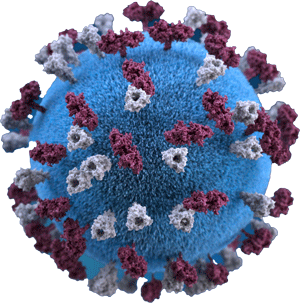 Source: NIH
Source: NIH
The outbreak that straddles the Utah-Arizona border has now grown to 182 cases, and is the second largest measles outbreak this year following the West Texas outbreak, which sickened at least 762 people, with three deaths.
Read more in this article by Stephanie Soucheray in CIDRAP News Brief.
Only 3,000 steps a day may help lower Alzheimer’s disease risk
November 5, 2025 Past studies have shown that certain healthy lifestyle choices, such as eating a balanced diet, managing stress, getting sufficient sleep, and engaging in regular physical activity, may help reduce a person’s risk of developing Alzheimer’s disease, a type of dementia. A new study published in the journal Nature Medicine, has found that older adults may be able to lower their risk of Alzheimer’s disease by taking as few as 3,000 steps a day.
 Source: NIH
Source: NIH
Read more in this article by Corrie Pelc in Medical News Today.
Weight loss drugs improve heart health regardless of amount of weight lost.
October 27, 2025 Researchers found that the reduction in major adverse cardiac event risk found during their 2023 study was similar regardless of how much a study participant’s weight was at the start of the trial and how much weight they lost over the first 4.5 months of taking semaglutide.
Read more in this article by Corrie Pelc in Medical News Today.
Study finds menopause causes brain changes that may affect memory, mood
October 25, 2025 While we know that menopause is related to some structural brain changes, we don’t have a clear understanding of whether these structural changes cause functional changes or cognitive decline.
Read more in this article by Erica Watts in Medical News Today.
Vaccine Integrity Project
October 21, 2025 CIDRAP's Vaccine Integrity Project is an initiative dedicated to safeguarding vaccine use in the U.S. so that it remains grounded in the best available science, free from external influence, and focused on optimizing protection of individuals, families, and communities against vaccine-preventable diseases.
Read more at the Center for Infectious Disease Research & Policy (CIDRAP).
COVID mRNA vaccines may be able to train immune system to attack cancer cells, boost survival
October 20, 2025 COVID-19 mRNA vaccination significantly improves survival in patients with advanced lung or melanoma skin cancer who had started taking immunotherapy drugs within the past 100 days, suggests data presented yesterday at the 2025 European Society for Medical Oncology Congress in Berlin.
 Source: CDC
Source: CDC
Read more in this article by Mary Van Beusekom at the Center for Infectious Disease Research & Policy.
Viewpoint: We owe parents real data before we mess with kids' vaccination schedule
October 15, 2025 There are no data suggesting the current schedule is unsafe or ineffective. Instead, concerns are being raised based on subjective impressions that children receive “too many shots” too early, rather than basing recommendations on facts or clinical outcomes.
Read more in this article by the Vaccine Integrity Project Staff and Advisers at Center for Infectious Disease Research & Policy (CIDRAP).
Both diet and regular sodas are linked to liver disease, new study finds
October 7, 2025 Consuming more than 330 grams, or about 1 can, of drinks from either beverage category daily was associated with a higher risk for developing metabolic dysfunction-associated steatotic liver disease (MASLD).
Read more in this article by Jessica Freeborn in Medical News Today.
99% of heart attack, stroke, heart failure cases linked to preventable risk factors
September 29, 2025 A new study of more than 9,000 adults reports that more than 99% of people who experienced a heart attack, heart failure, or stroke had at least one of four major cardiovascular risk factors — high blood pressure, cholesterol, or fasting glucose, as well as tobacco use — above ideal healthy levels beforehand.
Read more in this article by Corrie Pelc in Medical News Today.
Author of reviews of gender affirming care decries ‘egregious misuse’ of the findings to justify bans
September 22, 2025 Earlier this year, clinical epidemiologist Gordon Guyatt co-authored three systematic reviews on different types of gender-affirming care for children and young adults: puberty blockers, hormones, and top surgery. The studies were led by a Ph.D. student, and Guyatt was specifically pulled onto the team to make sure the assessment was as objective as possible.
Read more in this article by Theresa Gaffney in STAT10 Health.
Repeated head impacts cause early neuron loss and inflammation in young athletes
September 17, 2025 Research supported by the National Institutes of Health shows that repeated head impacts from contact sports can cause early and lasting changes in the brains of young- to middle-aged athletes. The findings show that these changes may occur years before chronic traumatic encephalopathy (CTE) develops its hallmark disease features, which can now only be detected by examining brain tissue after death.
Read more in this News Release from NIH.
Treating opioid addiction in jails improves treatment engagement, reduces overdose deaths and reincarceration
September 10, 2025 A study supported by the National Institutes of Health finds that individuals who received medication for opioid use disorder (MOUD) while incarcerated were significantly more likely to continue treatment six months after release than those who did not receive MOUD. The study also found that receiving MOUD in jail was associated with a 52% lower risk of fatal opioid overdose, a 24% lower risk of non-fatal opioid overdose, a 56% lower risk of death from any cause, and a 12% lower risk of reincarceration after release.
Read more in this News Release from NIH.
Beta-blockers may be harmful for women with some heart conditions
September 4, 2025 A recent study suggests that using beta-blockers does not improve certain outcomes after heart attacks where the left ventricular ejection fraction is preserved. Further analysis suggests that beta-blocker use may be harmful for women, especially for those who take beta-blockers at higher doses and for women who have preserved left ventricular ejection fraction.
Read more in this article by Jill Seladi-Schulman in Medical News Today.
Mediterranean diet may slow cognitive decline in those at high genetic risk
August 29, 2025 A new study recently published in the journal Nature Medicine reports that following a Mediterranean diet may help lower a person’s risk of developing dementia and decelerate cognitive decline.
Read more in this article by Corrie Pelc in Medical News Today.
Phantom limb study rewires our understanding of the brain
August 21, 2025 In a first-of-its-kind study, researchers found that the brain’s control center for a lost appendage can persist long after surgical amputation, which stands in stark contrast to longstanding theories about the brain’s ability to reorganize itself, also known as plasticity. Scientists from the National Institutes of Health (NIH) and their colleagues examined human brain activity before and after arm amputation and found that the loss of a limb does not prompt a large-scale cerebral overhaul. Published in the journal Nature Neuroscience, this study offers new insight into the mysterious phantom limb syndrome and could help guide the development of neuroprosthetics and pain treatments for people with limb loss.
Read more in this News Release from NIH.
Quitting smoking is associated with recovery from other addictions
August 13, 2025 Adults who smoke cigarettes and are addicted to alcohol or other drugs were more likely to achieve sustained remission of their substance use disorder symptoms if they also quit smoking, according to scientists at the National Institutes of Health. Based on their analysis of data from a large U.S. study of smoking and health, researchers believe the results clearly show the benefit of pairing smoking cessation with addiction recovery efforts.
Read more in this News Release from NIH.
Understanding depression in older adults
August 5, 2025 In older adults, in particular, depression can manifest differently than it might in younger people. For example, older adults living with depression might experience fewer classic depressive mood symptoms, instead experiencing more physical, cognitive, or psychotic symptoms.
Read more in this article by Oladimeji Ewumi in Medical News Today.
Can Ozempic help lower your risk of dementia?
July 29, 2025 A new study reports that semaglutide — the active ingredient in GLP-1 medications Ozempic and Wegovy for type 2 diabetes and weight loss — may help lower dementia risk in people with type 2 diabetes.
Researchers say semaglutide targets several dementia risk factors and is anti-inflammatory, which could explain this benefit to brain health.
Read more in this article by Corrie Pelc in Medical News Today.
Can PTSD cause memory loss?
July 21, 2025 Memory loss that occurs due to traumatic events is known as dissociative amnesia. In the Diagnostic and Statistical Manual of Mental Disorders, 5th revised edition (DSM-5-TR), dissociative amnesia appears in a category of conditions known as dissociative disorders.
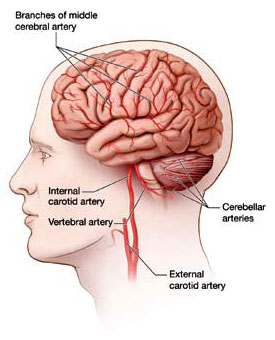
A person with dissociative amnesia may forget part or all of a distressing event. Memories may be fragmented, patchy, or missing key details. Alternatively, they may be missing entirely. A person may not remember a specific time period, person, or place.
Read more in this article by Ann Murnan in Medical News Today.
Why MAHA’s push on Coca-Cola and ice cream is ‘nutritionally hilarious’
July 17, 2025 MAHA's moves on Coca-Cola, ice cream called 'nutritionally hilarious' according to Marion Nestle. Whether Coca-Cola contains cane sugar or high-fructose corn syrup, she said, it will still contain virtually the same amount of calories and lots of sugar. (Coke currently has about 10 teaspoons a 12-ounce can.) That means soda will still pose the same risks when it comes to chronic conditions like type 2 diabetes and cardiovascular disease. “It’s the kind of thing that makes nutritionists roll their eyes, because it doesn’t make any difference,” Nestle said.
 Sucrose molecule from Wikipedia, released into public domain.
Sucrose molecule from Wikipedia, released into public domain.
Read more in this article by Sarah Todd in STAT Health.
MAHA’s European food envy is full of contradictions
July 10, 2025 It’s true that Europeans have lower rates of chronic disease and longer life expectancies than Americans, and nutrition experts say that European food policies are likely one contributing factor. But if the MAHA movement really wants to imitate Europe on food, they say, its leaders should pay more attention to policies they’ve so far overlooked — such as soda taxes, color-coded food warning labels, and heavier review of new products.
Read more in this article by Sarah Todd in STAT: the MAHA Diagnosis
Walking 100 minutes per day may help lower risk of chronic back pain
June 22, 2025 Our study shows that higher daily walking volume lowers the risk of developing chronic low back pain. The relationship was dose-dependent — meaning the more people walked, the lower their risk — up to about 100 minutes per day, after which the benefit leveled off. Even small increases in daily walking were associated with a decreased risk of chronic low back pain.
 CDC, public domain
CDC, public domain
Read more in this article by Corrie Pelc in Medical News Today.
A type of flavonoid found in tea and chocolate may help lower blood pressure
June 15, 2025 A new meta-study suggests that the flavan-3-ols, which are a type of plant-derived compound found in cocoa, tea, apples, and grapes, may be useful in managing high blood pressure. Specifically, they were found to be effective at improving endothelial function, which can significantly influence blood pressure.
Read more in this article by Robby Berman in Medical News Today.
Use of the 988 Suicide and Crisis Lifeline at National, Regional, and State Levels
June 9, 2025 The 988 Suicide and Crisis Lifeline launched nationally in July 2022. Little prior work has quantified use of 988, especially at subnational levels. In this study, we calculated lifetime and past-year incidence rates of 988 contacts and estimated prevalence of 988 use at national, regional, and state-levels.

Read more in this research letter from JAMA Open.
Projected Outcomes of Removing Fluoride From US Public Water Systems
May 30, 2025 Cessation of fluoridation of US public water systems is projected to worsen oral health in children and to significantly increase national health care costs.
Read this research report by Choi SE et al. in JAMA Health Forum.
Exercising earlier in the day, staying consistent can boost heart fitness
May 27, 2025 In this study, participants who had the most activity during the active part of their day relative to their daily resting time, and whose maximum daily activity happened earlier in the day, were correlated to better cardiorespiratory fitness and walking efficiency.
Read more in this article by Corrie Pelc in Medical News Today
First blood test for Alzheimer's gets FDA greenlight: 3 things to know
May 24, 2025 According to the FDA, the Lumipulse blood test works by measuring the amount of pTau 217 and beta-amyloid 1 in the plasma of the blood. The concentration ratio of the two proteins is used to determine the presence or absence of amyloid plaques in the brain, which is considered a hallmark of Alzheimer’s disease.
Read more in this article by Corrie Pelc in Medical News Today.
8-hour time-restricted eating may be key to long-term weight loss, trial finds
May 15, 2025 Also known as time-restricted eating, this type of dietary plan helps people lose weight and maintain weight loss by having a person only eat during a certain time period during the day. For example, a person might choose to fast for 12 hours a day and eat for the remaining 12 hours, or fast for 16 hours and eat for the remaining eight hours.
Read more in this article by Corrie Pelc in Medical News Today.
Measles: Overcoming Vaccine Hesitancy 20% off, use code ME5 at checkout.
May 10, 2025 Measles is one of the world’s oldest and most contagious viral diseases. It is the leading cause of infant and child mortality globally, though unvaccinated adults are also susceptible. This course discusses measles history, measles causes, types of measles, clinical symptoms of measles, treatment and prevention strategies re measles, and addresses positions of anti-vaccination advocates. It begins with a look at the availability of the MMR Vaccine and its vaccine resistance by some members of the public. Emphasis is on addressing the measles epidemic and wiping out measles altogether.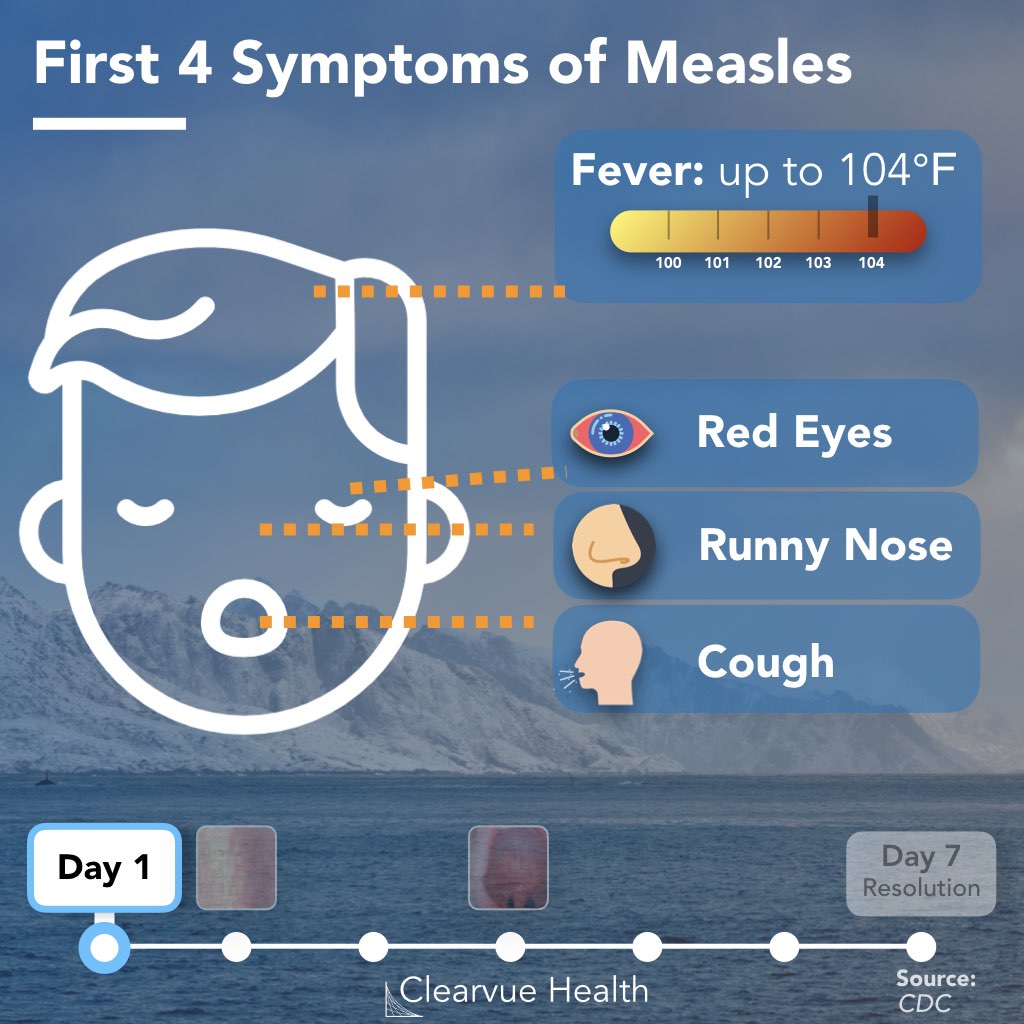 Courtesy of CDC.
Courtesy of CDC.
Read more in this 3-unit course by Sarah Reith.
Could being more active in middle age help prevent Alzheimer's disease?
May 4, 2025 A new study found that increased physical activity levels during middle age are associated with reduced amounts of the Alzheimer’s disease biomarker beta-amyloid in the brain.
Read more in this article by Corrie Pelc in Medical News Today.
63% of cardiac arrests could be preventable
April 29, 2025 A UK Biobank analysis that followed more than 500,000 adults for nearly 14 years has identified 56 lifestyle factors that could prevent up to 63% of sudden cardiac arrests — a condition with a survival rate below 10% when it occurs outside a hospital environment.
Read more in this article by Tim Newman in Medical News Today
NIH researchers supercharge ordinary clinical device to get a better look at the back of the eye.
April 23, 2025 New technique brings retina into sharper focus. The technique provides imaging resolution that rivals the most advanced devices available and is cheaper, faster, and doesn’t require specialized equipment or expertise.
 Courtesy of NIH.
Courtesy of NIH.
Read more in this news release from NIH.
Yoga as effective as strength exercises for osteoarthritis pain relief
April 17, 2025 Yoga is as effective for addressing knee pain due to osteoarthritis as muscle-strengthening exercises, according to a new study. The randomized clinical trial has also found that yoga may improve health-related quality of life and reduce depression in people with knee osteoarthritis.
 Courtesy of NIH.
Courtesy of NIH.
Read more in this article by Robbie Berman in Medical News Today.
Repurposing a blood pressure drug may prevent vision loss in inherited blinding diseases
April 15, 2025 New studies in rats suggest the drug reserpine, approved in 1955 for high blood pressure, might treat the blinding disease retinitis pigmentosa. No therapy exists for this rare inherited disease, which starts affecting vision from childhood.
Read more in this News Release from NIH.
Diabetes drugs like Ozempic or Jardiance may slash Alzheimer's risk
April 9, 2025 A new study investigates the relationship between specific diabetes drugs and dementia. They used data from more than 92,000 people with type 2 diabetes. The scientists found that two medications significantly reduce the risk of developing dementia in life.
Read more in this article by Tim Newman in Medical News Today.
Fact-Check: Did RFK Jr. Use Steroids to Build Muscle? Here's What We Know
April 3, 2025 Robert F. Kennedy Jr., now serving as Secretary of Health and Human Services under President Donald Trump, continues to face renewed scrutiny over his use of testosterone replacement therapy—an anabolic steroid—after posting a series of shirtless workout videos that went viral and reignited earlier claims he was using performance-enhancing drugs.
"The reason he looks like this is not because of the vitamins," body builder Greg Doucette said in the video. "It's not because he doesn't consume pesticides. It doesn't have anything to do with this. It's because he trains harder than last time, and he's on test, (also known as) steroids."
Read more in this article by Jenna deJong in Newsweek.
CDC Layoffs Deliver Devastating Blow to Respiratory Health
April 1, 2025 We are all deeply concerned about recent staff reductions at CDC, which put critical public health programs at risk. These cuts threaten essential services for millions of people with asthma and allergies, worsening health outcomes and limiting efforts to address environmental and occupational health risks. Nearly 28 million people in the United States have asthma and about 10 people still die every day from the disease.

Read more in this press release from the Asthma and Allergy Foundation of America.
A1C chart and understanding A1C levels
March 27, 2025 The A1C test measures a person’s average blood glucose or blood sugar levels over the past 3 months. An A1C reading of over 5.6% may be a cause for concern, but this will depend on various factors.
Read more in this article by Heather Grey in Medical News Today.
Scientists unveil how key protein malfunctions and leads to Parkinson's
March 20, 2025 The exact cause of Parkinson’s disease remains unknown; however, researchers know some genetic factors contribute to the condition, such as a mutation in the PINK1 gene. A new study for the first time explains what human PINK1 looks like and how it is activated. Researchers believe these findings may help one day lead to new treatment options for Parkinson’s disease.

Read more in this article by Corrie Pelc in Medical News Today.
NIH-funded study identifies potential new stroke treatment
March 17, 2025 In a preclinical study, rodents treated with uric acid showed improved long-term outcomes after acute ischemic stroke. The findings suggest that the treatment may work as an add-on therapy to standard stroke treatments in humans.
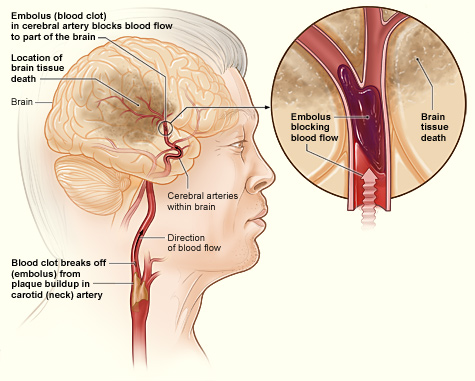 Courtesy of NIH
Courtesy of NIH
Read more in this media advisory from NIH.
Vitamin A can't prevent measles. Experts explain what this supplement actually does
March 14, 2025 In the past, severe vitamin A deficiency led to more severe outcomes with measles. Because of this, it is recommended that two doses of vitamin A be given to children (especially those under the age of 2 years old) with severe measles. However, experts caution that vitamin A provides no benefit as a preventive measure.
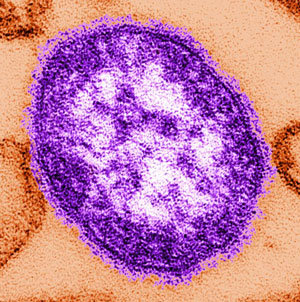 Courtesy of NIH
Courtesy of NIH
Read more in this article by Yasemin Nicola Sakay in Medical News Today.
Intermittent fasting may help prevent blood clots
March 6, 2025 Researchers, using 160 study participants, human blood samples, and mice, found that intermittent fasting appears to help stop platelet activation and clot formation. The results suggest that it does this by enhancing the gut microorganisms’ production of indole-3-propionic acid, which then affects clotting.
Read more in this article by Jessica Freeborn in Medical News Today.
Omalizumab treats multi-food allergy better than oral immunotherapy
March 3, 2025 A clinical trial has found that the medication omalizumab, marketed as Xolair, treated multi-food allergy more effectively than oral immunotherapy (OIT) in people with allergic reactions to very small amounts of common food allergens.
 Courtesy of NIH
Courtesy of NIH
Read more in this news release from NIH.
GLP-1 could help reduce brain inflammation
February 23, 2025 According to the existing research, the “function of GLP-1 agonists is to lower serum glucose levels and thereby manage metabolism in affected patients.” GLP-1 drugs also improve blood flow to the heart and act directly on the hypothalamus to increase the sensation of being full after a meal. Besides these metabolic effects, GLP-1 drugs also appear to have an impact on brain health and mental health.
Read more in this article by Erika Watts in Medical News Today.
Health misinformation and disinformation: How to avoid it
February 21, 2025 In the age of viral content and fast and furious social media communication, disinformation and misinformation, including about health matters, are spreading more widely than ever. Why is this the case exactly, and how can we learn to spot inaccurate and even malicious health information? Why do we fall so easily for false health info, and how can we update our mistaken beliefs?
Read more in this article by Maria Cohut in Medical News Today.
Can drugs like Ozempic help with COPD?
February 17, 2025 A new study published in JAMA Internal Medicine reports that people who have type 2 diabetes and are treated with sodium-glucose cotransporter-2 inhibitors (SGLT-2is) or glucagon-like peptide-1 receptor agonists (GLP-1RAs) — like Ozempic and Wegovy — may be at a lower risk of moderate or severe COPD exacerbations, or symptom flare-ups, compared to those taking dipeptidyl peptidase 4 inhibitors (DPP-4is).
Read more in this article by Corrie Pelc in Medical News Today.
Are eggs good or bad for cholesterol? Outdated misconceptions seem to persist
February 14, 2025 A new study has found that misconceptions about eggs may still be keeping people from including them in their daily diets.
 From Wikipedia
From Wikipedia
Read more in this article by Corrie Pelc in Medical News Today. (The research was funded by an unrestricted grant from the American Egg Board’s Egg Nutrition Center, but the authors declare no conflicts of interest.)
Daily omega-3 supplements and regular exercise may slow aging
February 7, 2025 A new study In Nature Aging suggests that omega-3 and vitamin D supplements, when combined with regular exercise, may help slow biological aging by several months over a 3-year period.
Read more in this article by Paul Ian Cross in Medical News Today.
Use of Body Armor by EMS Clinicians, Workplace Violence, and Racial and Ethnic Disparities in Care
January 29, 2025 Workplace violence is a significant occupational hazard, with data from the Bureau of Labor Statistics demonstrating the rate of workplace violence injuries among health care practitioners to be more than 3 times higher than the national average for all occupations in the US. This includes EMS personnel who are often exposed to workplace violence in the field and in the homes of patients, often with fewer resources and staff to mitigate violence.
Read more in this original investigation in JAMA Network Open.
Contact lenses used to slow nearsightedness in youth have a lasting effect
January 16, 2025 In a study funded by the National Institutes of Health, researchers found that children who wore special contact lenses to slow progression of nearsightedness, known as myopia, maintained the treatment benefit after they stopped wearing the contacts as older teens.
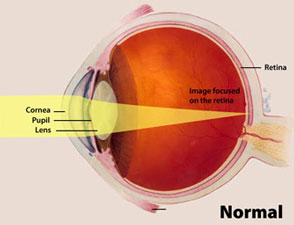 Courtesy of NIH.
Courtesy of NIH.
Read more in this media advisory from NIH.
NIH-funded study finds cases of ME/CFS increase following SARS-CoV-2
January 13, 2025 New findings from NIH suggest that infection with SARS-CoV-2 may be associated with an increase in the number of myalgic encephalomyelitis/chronic fatigue syndrome (ME/CFS) cases.
Read more in this media advisory from NIH.
NIH researchers discover novel class of anti-malaria antibodies
January 3, 2025 A novel class of antibodies that binds to a previously untargeted portion of the malaria parasite could lead to new prevention methods, according to a study from researchers at the National Institutes of Health published today in Science.
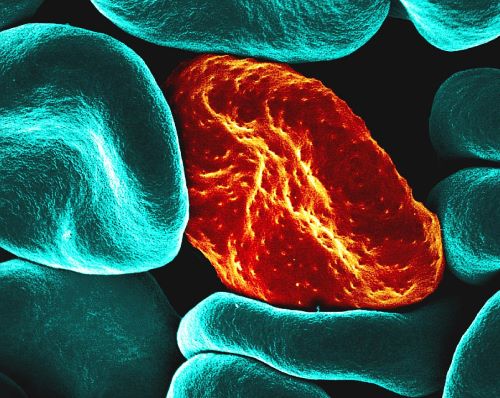 Red blood cells infected with malaria (orange cell). Courtesy of NIH.
Red blood cells infected with malaria (orange cell). Courtesy of NIH.
Read more in this media advisory from NIH.
Aging may change some brain cells more than others
January 2, 2025 Based on new brain mapping research funded by the National Institutes of Health (NIH), scientists have discovered that not all cell types in the brain age in the same way. They found that some cells, such as a small group of hormone-controlling cells, may undergo more age-related changes in genetic activity than others. The results, published in Nature, support the idea that some cells are more sensitive to the aging process and aging brain disorders than others.
 CDC.
CDC.
Read more in this news release from NIH.
Aerobic Exercise and Weight Loss in Adults
December 26, 2024 In this meta-analysis of randomized clinical trials, engaging in 30 minutes of aerobic exercise per week was associated with modest reductions in body weight, waist circumference, and body fat measures among adults with overweight or obesity.
 National Institutes of Health
National Institutes of Health
Read more in this systematic review in JAMA Network Open.
Reported use of most drugs among adolescents remained low in 2024
December 17, 2024 After declining significantly during the COVID-19 pandemic, substance use among adolescents has continued to hold steady at lowered levels for the fourth year in a row, according to the latest results from the Monitoring the Future Survey, which is funded by the National Institutes of Health. These recent data continue to document stable and declining trends in the use of most drugs among young people.
Read more in this news release from the National Institutes of Health.
Long-term exposure to air pollution linked to blood clots in veins that bring blood to the heart
December 12, 2024 A large study found that greater exposure to long-term air pollution was linked with increased risks for blood clots that can occur in deep veins, which, if untreated, can block blood flow and cause serious complications, even death.
Read more in this media advisory from the National Institutes of Health.
In five cancer types, prevention and screening have been major contributors to saving lives
December 5, 2024 Improvements in cancer prevention and screening have averted more deaths from five cancer types combined over the past 45 years than treatment advances, according to a modeling study led by researchers at the National Institutes of Health.
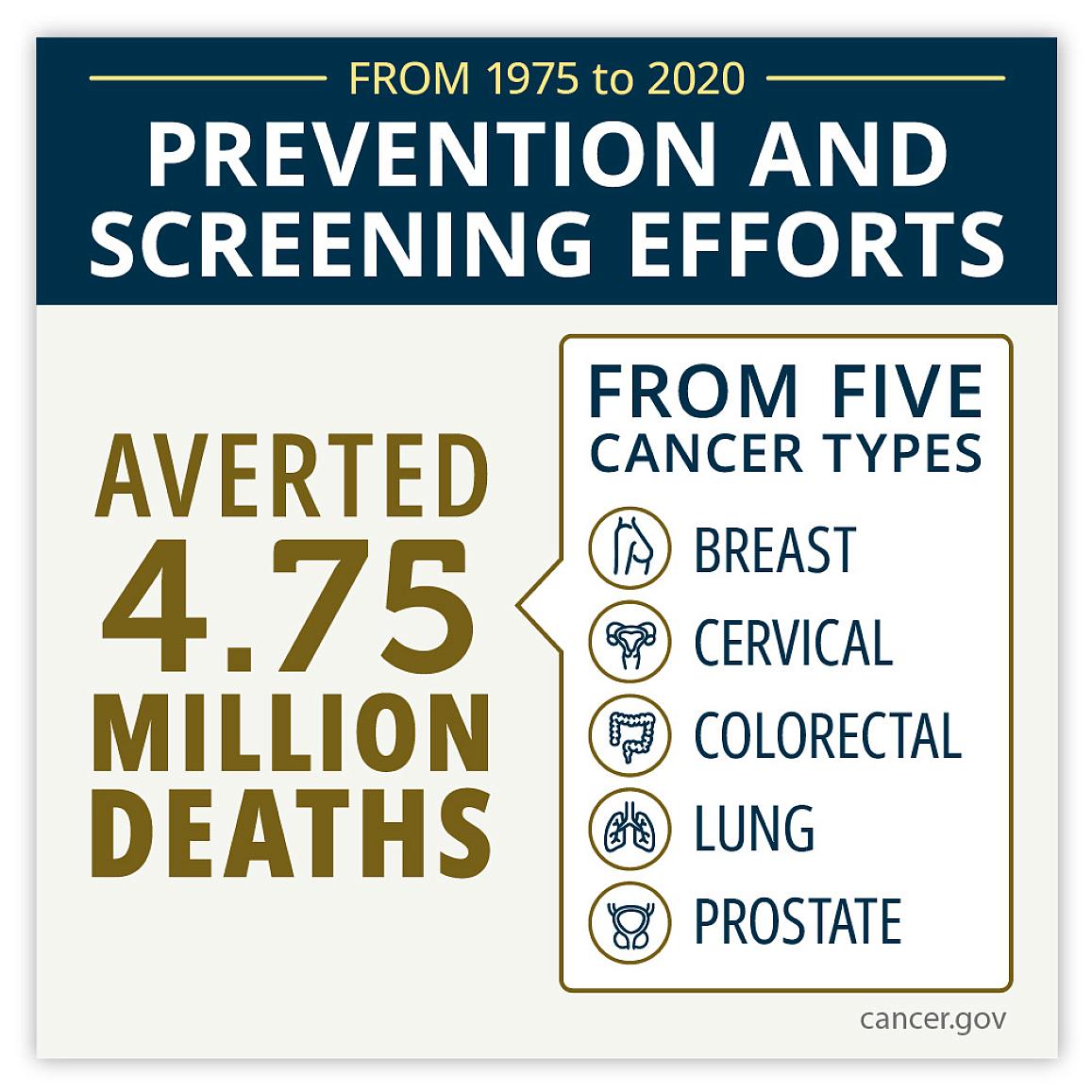 From Cancer.gov
From Cancer.gov
Read more in this news release from the National Cancer Institute.
NIH-led scientific team defines elements of brain-based visual impairment in children
November 19, 2024 Experts convened by the National Institutes of Health (NIH) have identified five elements of a brain-based condition that has emerged as a leading cause of vision impairment starting in childhood in the United States and other industrialized nations. Known as cerebral (or cortical) visual impairment (CVI), some estimates suggest that at least 3% of primary school children exhibit CVI-related visual problems, which vary, but may include difficulty visually searching for an object or person or understanding a scene involving complex motion. Their report, based on evidence and expert opinion, was published today in Ophthalmology.
Read more in this news release from NIH.
Researchers uncover new role of mutant proteins in some of the deadliest cancers
November 12, 2024 Researchers at the National Institutes of Health (NIH) and their collaborators have discovered a new way in which RAS genes, which are commonly mutated in cancer, may drive tumor growth beyond their well-known role in signaling at the cell surface. Mutant RAS, they found, helps to kick off a series of events involving the transport of specific nuclear proteins that lead to uncontrolled tumor growth, according to a study published Nov. 11, 2024, in Nature Cancer.
Read more in this news release from NIH.
Salivary Enzyme Behind Our Carb Cravings May Have Unexpectedly Ancient History
November 7, 2024 Digestion involves much more than just your stomach. The digestive process that fuels your body begins in your mouth each time you take a bite of food and chew. An enzyme in your saliva, called amylase, then starts to break down complex carbohydrates—or starches found in many fruits, vegetables, and grains—into simpler sugars to give you their sweet flavor followed by a burst of energy.
Read more in this article by Dr. Monica M. Bertagnolli in NIH Director's Blog.
Why protective antibodies fade after COVID-19 vaccines
October 29, 2024 Researchers found that current COVID-19 vaccines fail to generate mature and durable antibody-producing cells in the bone marrow. The findings could help explain why protection tends to decline over time. Better understanding of long-term immune responses could lead to improved vaccines that provide enduring protection.
 From NIH
From NIH
Read more in this news release from NIH Research Matters.
New course: Pennsylvania: Child Abuse, Recognition and Reporting for Mandated Reporters, 3 units (331)
October 20, 2024 This online course is for healthcare providers and other professionals in Pennsylvania who are mandated to report suspected child abuse.
Click here to access PA Child Abuse, 3 units.
Alzheimer’s disease may damage the brain in two phases
October 15, 2024 Alzheimer’s disease may damage the brain in two distinct phases, based on new research funded by the National Institutes of Health (NIH) using sophisticated brain mapping tools. According to researchers who discovered this new view, the first, early phase happens slowly and silently — before people experience memory problems — harming just a few vulnerable cell types. In contrast, the second, late phase causes damage that is more widely destructive and coincides with the appearance of symptoms and the rapid accumulation of plaques, tangles, and other Alzheimer’s hallmarks.
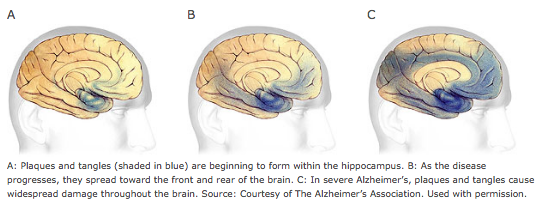
Read more in this news release from NIH.
NIH launches large study to tackle type 2 diabetes in young people
October 9, 2024 In an effort to identify risk factors for youth-onset type 2 diabetes to improve prevention and treatment, the National Institutes of Health has launched a nationwide consortium to address the dramatic rise in youth diagnosed with type 2 diabetes over the past two decades, a trend that is expected to continue.
Read more in this press release from NIH.
Use of metformin in adults with diabetes linked to lower risk of long COVID
September 17, 2024 Large NIH-funded study supports previous studies showing potential benefit. Adults who use the prescription drug metformin to treat their type 2 diabetes have a lower risk of developing long COVID or dying after a COVID-19 infection than people with diabetes who take other anti-diabetes medications, according to a large study supported by the National Institutes of Health.
Read more in this news release from NIH.
Experimental blood test predicts risk for developing COPD, other severe respiratory diseases
September 10, 2024 A scientific team supported by the National Institutes of Health (NIH) has created a preclinical blood test to identify adults most likely to develop severe respiratory conditions, including chronic obstructive pulmonary disease (COPD).
 Courtesy of NIH
Courtesy of NIH
Read more in this news release from NIH.
Doctors use problematic race-based algorithms to guide care every day. Why are they so hard to change?
September 3, 2024 Pediatrician Alexandra Epee-Bounya had had enough. In her 20 years caring for children in Boston, she had seen hundreds of kids with suspected urinary tract infections. Each time, she’d turn to a calculator, used by all Boston Children’s Hospital clinicians, to judge the youngest children’s risk. Did the infant have a high fever? Add a point. Was she a girl? Add two points.
As she went down the list, one of the factors tripped her up every time: Was the child Black? If not, add a point. The more points, the higher the risk of a UTI, which meant the child would get follow up testing. How could it be that the color of a child’s skin dictated their care?
Read more in this article by Katie Palmer and Usha Lee McFarling in STAT.
Cannabis and hallucinogen use among adults remained at historic highs in 2023
August 29, 2024 Reports of vaping nicotine or vaping cannabis in the past year among adults 19 to 30 rose over five years, and both trends remained at record highs in 2023.
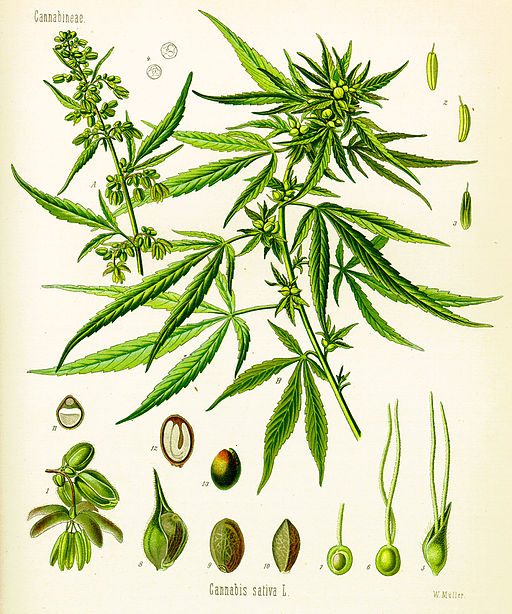 Courtesy of NIH
Courtesy of NIH
Read more in this news release from NIH.
Self-adjusting brain pacemaker may help reduce Parkinson’s disease symptoms
August 20, 2024 A small feasibility study funded by the National Institutes of Health (NIH) found that an implanted device regulated by the body’s brain activity could provide continual and improved treatment for the symptoms of Parkinson’s disease (PD) in certain people with the disorder.
 Courtesy of NIH
Courtesy of NIH
Read more in this news release from NIH.
NIH launches program to advance research led by Native American communities on substance use and pain
August 15, 2024 Many Tribal Nations have developed and continue to develop innovative approaches and systems of care for community members with substance use and pain disorders. During NIH Tribal Consultations in 2018 and 2022, Tribal leaders categorized the opioid overdose crisis as one of their highest priority issues and called for research and support to respond. They shared that Native communities must lead the science and highlighted the need for research capacity building, useful real-time data, and approaches that rely on Indigenous Knowledge and community strengths to meet the needs of Native people.
Read more in this news release for NIH.
NIH researchers discover potential therapeutic target for degenerative eye disease
Study reveals cellular pathology of “dry” AMD.
July 26, 2024 Researchers from the National Institutes of Health (NIH) have discovered the source of dysfunction in the process whereby cells in the eye's retina remove waste.
 Courtesy of NIH
Courtesy of NIH
A report by scientists at NIH and Johns Hopkins University, Baltimore, details how alterations in a factor called AKT2 affects the function of organelles called lysosomes and results in the production of deposits in the retina called drusen, a hallmark sign of dry age-related macular degeneration (AMD). According to the researchers, the findings suggest drusen formation is a downstream effect of AKT2-related lysosome dysfunction and points to a new target for therapeutic intervention.
Read more in this news release from NIH.

 Facebook
Facebook X
X LinkedIn
LinkedIn Forward
Forward